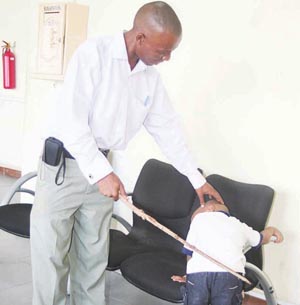Spanking is a heated topic of discussion when it comes to parenting circles, and a new study suggests that whacking kids leads to more aggressive behaviour at a later age.

The new study conducted by researchers from the Tulane University School of Public Health and Tropical Medicine and published last Monday in the journal Pediatrics provides the strongest evidence yet against the use of corporal punishment.
Researchers have studied nearly 2,500 youngsters, and discovered that those who were spanked more frequently at age 3 were more likely to be aggressive by age 5.
In Tanzania, spanking in schools is legal, just like in many other east African countries, including Kenya. However, not just any teacher should administer corporal punishment, but the school head or a teacher appointed by him or her to correct a misbehaving student.
According to UN education agency, Unesco, teachers in the country say they do not like using this form of punishment but they "think it is the easiest way to manage big classes."
East African governments complain that there are not enough resources and trained personnel to reduce the size of big classes, which some teachers find difficult to manage without corporal punishment.
Many parents also endorse spanking, and still believe in its effectiveness as a behaviourchanging tactic. But the new study notes that the children who were spanked as a regular form of discipline were also found to be at greater risk of exhibiting bullying behaviour when they turned five years of age.
The Tulane research supports earlier works on the pitfalls of corporal punishment, particularly in schools, including a study conducted by the Dar es Salaam-based Research on Poverty Alleviation (Repoa) and UN children agency Unicef, titled `Views of the children 2007'.
The study, which focused on a wide range of punishment methods used on students in local schools, showed that corporal punishment disrupted learning, instilled fear in students, and consequently affected their ability to understand when the teacher is conducting a lesson.
Students interviewed in the research said among the commonest form of corporal punishment were slapping, and the pulling of ears, which accounted for 70 per cent of the methods their teachers used in punishment.
Lacks effectiveness Many child development experts are of the opinion that disciplining young children through spanking, for any reason, lacks longterm effectiveness as a behaviour-changing tactic.
Instead, they support strategies such as time-outs when children misbehave, which focus on getting kids to reflect on their behaviour and the consequences of their actions.
Still, as many parents can attest, few responses bring about the immediate interruption of a full-blown tantrum like a swift whack to the bottom.
In the new study, the researchers accounted for other factors such as acts of neglect by the mother, violence or aggression between the parents. They also accounted for maternal stress and depression, the mother's use of alcohol and drugs, and even whether the mother considered abortion while pregnant with the child.
In all the case, they found that the positive connection between spanking and aggression remained strong. Although each of these factors contributed to children's aggressive behaviour at age 5, the experts could not explain all of the violent tendencies at that age. "In other words, what the study shows is that outside of the most obvious factors that may influence violent behaviour in children, spanking remains a strong predictor". Among the mothers who were studied, nearly half (45.6 per cent) reported no spanking in the previous month, 27.9 per cent reported spanking once or twice and 26.5 per cent reported spanking more than twice.
Compared with children who were not hit, those who were spanked were more likely to be defiant, demand immediate satisfaction of their wants and needs, get frustrated easily, have temper tantrums and lash out physically against others.
The reason for that, anaysts say, may be that spanking instills fear rather than understanding. Even if a child were to stop his screaming tantrum when spanked, that doesn't mean he understands why he shouldn't be acting up in the first place. What's more, spanking models aggressive behaviour as a solution to problems.
For children to understand what and why they have done something wrong, it may take repeated efforts on the parent's part, using time-outs -a strategy that typically involves denying the child any attention, praise or interaction with parents for a specified period of time (that is, the parents ignore the child).
These quiet times force children to calm down and learn to think about their emotions, rather than acting out on them blindly.
Spanking may stop a child from misbehaving in the short-term, but it becomes less and less effective with repeated use, child experts say. It also makes discipline more difficult as the child gets older and outgrows spanking.
As the latest study shows, investing the time early on to teach a child why his behaviour is wrong may translate to a more self-aware and in-control youngster in the long run.
